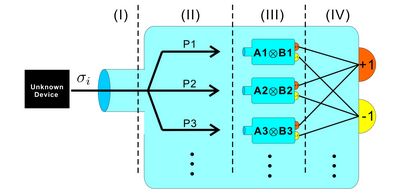Experimental Optimal Verification of Entangled States Using Local Measurements
Quantum information is a field where the information is encoded into quantum states. Taking advantage of the “quantumness” of these states, we can perform more efficient computations and more secure cryptography compared to their classical counterparts.
A team led by Prof. GUO Guangcan from University of Science and Technology of China (USTC) of CAS modified the original proposal to be robust to practical imperfections, and experimentally implement a scalable quantum state verification on two-qubit and four-qubit entangled states with nonadaptive local measurements. The research results were published in Physical Review Letters on July 17th.
The initialization of a quantum system into a certain state is a crucial aspect of quantum information science. While a variety of measurement strategies have been developed to characterize how well the system is initialized, for a given one, there is in general a trade-off between its efficiency and the accessible information of the quantum state. Conventional quantum state tomography can characterize unknown states while requiring exponentially expensive time-consuming postprocessing.
Alternatively, recent theoretical breakthroughs show that quantum state verification provides a technique to quantify the prepared state with significantly fewer samples, especially for multipartite entangled states.

Diagram of the QSV of two-qubit entangled states with local measurements. (Image by ZHANG Wenhao et al.)
In the research led by Prof. GUO Guangcan, for all the tested states, the estimated infidelity is inversely proportional to the number of samples, which illustrates the power to characterize a quantum state with a small number of samples. Compared to the globally optimal strategy which requires nonlocal measurements, the efficiency in their experiment is only worse by a small constant factor (<2.5).
They compared the performance difference between quantum state verification and quantum state tomography in an experiment to characterize a four-photon Greenberger-Horne-Zeilinger state, and the results indicate the advantage of quantum state verification in both the achieved efficiency and precision.
They experimentally realized an optimal quantum state verification (QSV), which is easy to implement and robust to realistic imperfections. The exhibited 1/n scaling results from the strategy itself without entangled or adaptive measurements.
Their results have clear implications for many quantum measurement tasks and may be used as a firm basis for subsequent work on more complex quantum systems.
(Written by LI Xiaoxi, edited by LI Xiaoxi, USTC News Center)
Back
